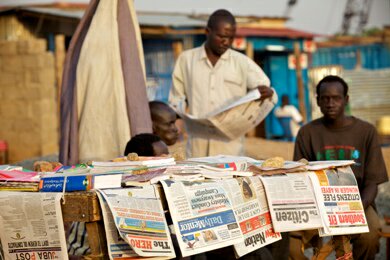South Sudan security confiscates newspapers over federalism coverage
July 7, 2014 (JUBA) – South Sudanese security operatives raided the premises of the independent Citizen newspaper, confiscating all copies of its Monday edition, the paper’s editor-in-chief said.

“I don’t know why they did that. I don’t know the reasons for targeting us, when we are just doing our work, giving both sides a flat form to present their arguments,” he added.
The veteran journalist, however, said he believes his deliberate failure to honour last week’s summons by government agents may have influenced Monday’s raid on their Juba offices.
“I think they are not happy because I did not go to them last week. They wanted me to go with others but I did not go. They asked me to go with others but I told them I was not responsible for others. I don’t know the reason they wanted all the heads of the media houses. They did not explain to me and we can’t guess,” he explained.
HUGE LOSSES
Akren said confiscation of the papers represented huge financial losses to the company since he is expected to pay for printing and other administrative costs.
The seizure of newspapers comes barely a week after another publication was confiscated over similar issues.
A journalist working with the Citizen said security forces stormed their premises and searched distribution area, confiscating all copies of the publication, which affected its Monday edition.
He further explained that the heavily armed security forces who stormed their premises claimed they were acting on orders from the government.
“One of the security men told us that they were acting on an order from above as there were allegations that we have covered a controversial debate about federalism, which say had been stopped yet we continue to cover and make publication against the interest of the public,” the journalist who spoke on condition of anonymity told Sudan Tribune.
South Sudan’s information ministry remained silent on the raid, although its minister, Michael Makuei Lueth last week denied that a ban had been imposed on federalism debates.
A senior security officer confirmed the operations, but argued that it was over “security concerns” and not to stifle freedom of expression.
The South Sudanese government is under increasing pressure to respond to the public demand to open up space for free public about the type of the system of governance and concerns aimed at ending crisis and bringing peace.
Another security officer claimed their action to confiscate the paper was necessitated by intelligence reports allegedly implicating the newspaper in coverage of highly sensitive matters.
“There is nothing one say about this action. It is an act reminiscent of the dictatorial tendencies of which this regime always denied. But if you see what they do, it is a pure dictatorship,” an angry journalist told Sudan Tribune when asked to react to the issue.
“In this country, anybody with an alternative view is a rebel, even infants if they cry in a way that does not please the agents of this government, especially those around the president,” he added.
Aken further said that government agents did not give “any reason for their action”, but admitted that the newspaper recently published an article that was critical of the regime.
Senior members of the ruling party (SPLM) said it was against their policy to deny the public their right to access information and express their views over matters that require government attention.
“This is not a policy of the SPLM. The press freedom and freedom of expression is one of our basic values. And I believe that denying our people access to news and information sows the seeds of rumours and distrust,” said the official who asked not to be named.
“While we recognise that the country faces security threats, these can never effectively be addressed by media blackouts or persecution of journalists. I call on authorities to respect the vital role that media play in circulating information and holding government to account,” he added.
On 2 July, the information ministry issued a statement clarifying that the government had not prevented the media or members of the public from openly debating on federalism and that such debates would help shape opinions for informed decisions.
(ST)
